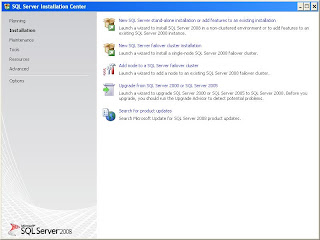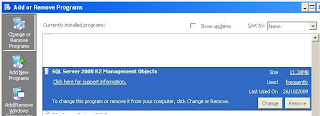Without asking it upgraded my \SQLEXPRESS instance to MS SQL2008 fro MSSQL2005.
I then had to jump through flaming hoops to install the update MSSQL Management studio express, installing 2 pre-requisites, Windows Installer 4.5 and Windows Powershell 1.0. (I'm on XP , I hope these are on Vista or Win 7) and then when I eventually could run the installer I perhaps the most confusing installation screen in the world, ever.
I think I went for a full installation on this page and it just installed me Studio, I can't be sure as I went round the houses several times and now I can't even find out how to uninstall the little s***t to test.
R2 Management Objects?
Very naughty VS2010.
It also prompted me to restart mid installation with this gem of a dialogue box.



